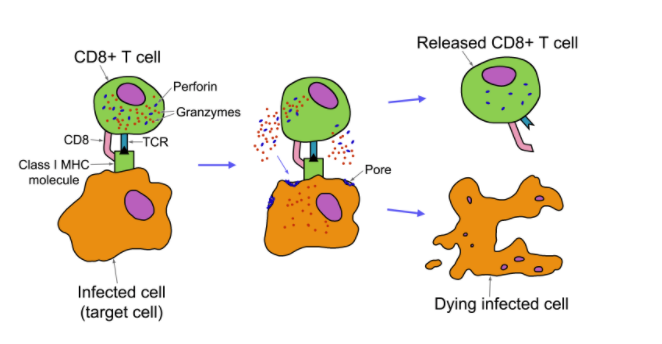Question
Question: Are T cells innate or adaptive?...
Are T cells innate or adaptive?
Solution
Dendritic cells (DCs), which are the only cells that can trigger fundamental immune responses, are a key connection between innate and adaptive immunity. As part of the innate immune system, DCs collect and transfer information from the outside world to the cells of the adaptive immune system.
Complete answer:
The T cell as a connection between the innate and adaptive immune systems has implications for the kidney. Traditionally, the immune system is separated into two parts: innate and adaptive, each with its own set of responsibilities and functions. T cells play an important role in the adaptive immune system. T cells have been linked to a number of immune-mediated kidney diseases and are being investigated as a potential therapeutic target. Ischemic acute renal failure, which is a major cause of native kidney and allograft failure, is mediated in part by inflammatory components of the innate immune system.
In experimental models of the kidney, liver, gut, brain, and heart, T cells have lately been implicated as important mediators of ischemia-reperfusion damage. These findings provide insight into the cause of ischemic acute renal failure and hint at novel and promising therapy possibilities. T cells' functional potential extends beyond adaptive immunity to the innate immune response, as evidenced by their discovery as a mediator of early alloantigen-independent tissue damage.

Granulocytes are leukocytes with granules in their cytoplasm that carry enzymes. Neutrophils, basophils, and eosinophils are all granulocytes. Neutrophils are the innate immune system's first responders. Neutrophils and macrophages scour the bloodstream for abnormalities and remain in tissues. Both cells can “eat” bacteria and communicate with other immune cells in the event of a crisis.
Adaptive immune system cells (also known as immune effector cells) perform an immunological function in response to a stimuli. Natural killer T lymphocytes and B lymphocytes are examples of effector cells. To kill infections, activated T lymphocytes, for example, use a cell-mediated response. B cells that have been activated release antibodies that aid the immune system in mounting an attack. Cancer is fought with the help of effector cells.
Non-effector cells include antigen-presenting cells (APCs) such as dendritic cells, regulatory T cells, tumor-associated macrophages, and myeloid-derived suppressor cells. Non-effector cells can't kill tumours by themselves. Non-effector cells prevent effector cells from performing their immunological function. In cancer, non-effector cells allow tumours to grow and spread.
Note: The thymus gland has two lobes and is located above the heart, behind the sternum, and between the lungs. The thymus is active only until puberty, after which it gradually declines and is replaced by fat and connective tissue. The thymus is responsible for producing thymosin, a hormone that aids in the growth of T cells. While in the thymus, T cells proliferate, acquire additional antigen receptors, and mature into helper T cells and cytotoxic T cells.
